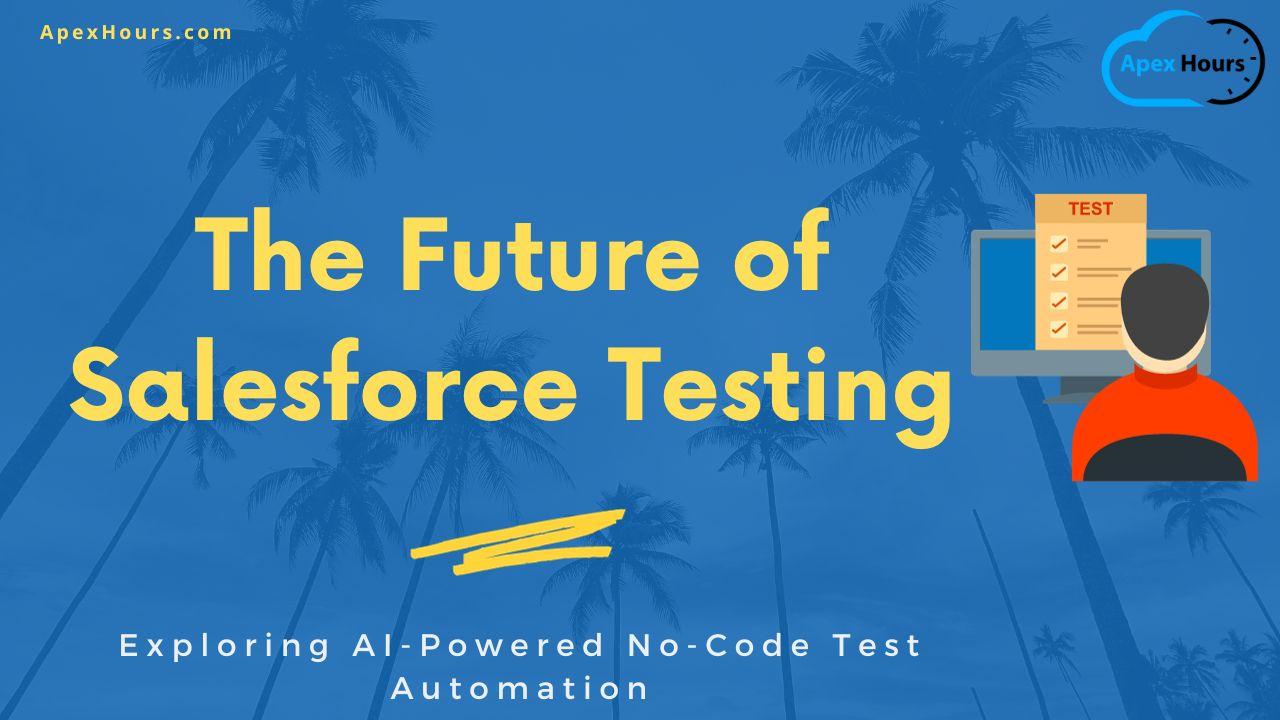Whether for sales or analytics, marketing, or accounting, Salesforce is used by millions of users across the world. However, if you want to make the most of Salesforce, testing is crucial. Salesforce test automation with AI can help manage and update the Salesforce technology stack and ensure top-notch performance. Let see the The Future of Salesforce Testing: Exploring AI-Powered No-Code Test Automation.
Why Is Salesforce Testing Crucial?
Salesforce offers a wide array of capabilities across the customer lifecycle. It allows sales teams to keep track of interactions, manage leads and contacts, and improve collaboration. Integrated to work as a unified solution, Salesforce helps meet the needs of different departments with equal finesse.
If you’ve been using Salesforce, you might wonder why such a cutting-edge and advanced platform would need testing. Although every Salesforce tool is released with continuously and carefully tested features and capabilities, conducting Salesforce testing allows you to:
- Align business and technology goals and ensure the Salesforce platform capabilities are in-line with the evolving needs of the business.
- Verify the performance of new releases by testing newly introduced features and determining how they impact existing workflows.
- Evaluate customizations made by different departments and business units and ensure the modifications do not impact the performance, availability, security, or scalability of your Salesforce tool.
- Detect issues early in the lifecycle and prevent them from impacting business performance or user experience.
- Increase platform efficiency by constantly evaluating the platform against industry benchmarks, evolving technology trends, and market fluctuations.
- Ensure seamless integration of your Salesforce platform with existing (and new) systems in your business ecosystems.
- Enhance the user experience by setting up different test cases for multiple user personas and streamlining usage of the Salesforce platform.
Salesforce Testing Solutions
When it comes to Salesforce testing, you have many options to detect defects and improve efficiency.
Native Salesforce Testing
Native Salesforce testing enables testing teams to verify the quality and functionality of their Salesforce platform. Focused on the developer, it allows teams to create and manage simple unit tests. But native Salesforce testing can get incredibly complex when the level of customization is high.
Manual Testing
With manual testing, testing teams can test different features and capabilities of the newly released Salesforce platform. But the problem with manual testing is that it is extremely error-prone and cannot be scaled so easily.
Exploratory Testing
Exploratory testing enables teams to identify bugs that often go undiscovered with traditional testing. Testers can play around with different test cases and fill the gaps by testing outside the typical scenarios. But with exploratory tests, it is often difficult to reproduce bugs and failures. Testers also fail to keep track of what they’ve tested, leading to unnecessary repeat or missed tests.
Open-Source Testing
Using open-source tools like Selenium is another popular way of testing Salesforce. However, to achieve success, testers need to possess a relatively high skill level and proficiency. As the skills gap grows, finding talent that can keep up with the rate of change of the Salesforce platform is difficult.
Salesforce Testing Challenges
If you think you can simply adopt one of the testing options to test your Salesforce instance, think again. The Salesforce platform is an extremely advanced and complicated system that brings about various Salesforce test automation challenges for testing teams.
Varied Testing Requirements
The frequent updates and improvements in Salesforce result in varied testing requirements. QA teams must constantly update test suites to prevent tests from breaking.
Dynamic Frames
Salesforce tools are built with complex dynamic frames that load content independently. Accessing the content directly is extremely difficult, especially when dealing with nested or hidden frames.
UI Testing Issues
In addition to frames, Salesforce applications have dynamic UI, which makes the test automation framework development challenging.
Complex Test Case Maintenance
With new features and updates constantly launched, test case maintenance is tough. Teams need to enable more than average maintenance because of the rate of updates and customizations.
Browser Testing Issues
Salesforce applications must work on multiple browsers, OSes, and test environments. Setting up different tests and ensuring accurate cross-browser testing across different scenarios takes a lot of time and effort.
How AI-Powered Test Automation Helps

If you want to efficiently deal with the Salesforce tech stack, you need a testing approach that aligns with evolving updates and changes. AI-powered test automation is a great way to overcome common Salesforce testing challenges.
Optimized for Salesforce’s dynamic technology, AI-powered test automation helps enhance and streamline testing processes. QA automation overcomes the reliance on traditional manual testing and addresses challenges by utilizing various AI techniques. Using advanced models, it helps improve the efficiency, accuracy, and coverage of software testing activities via:
Intelligent Test Automation
AI algorithms can automatically generate test cases, paving the way for intelligent test automation. Using AI-powered test automation, testing teams can analyze the code, specifications, and requirements of the Salesforce application. They can also help recognize potential test scenarios that might not be evident to human testers.
Codeless Testing
AI-powered test automation eliminates the need for manual testing, allowing for quick and efficient codeless testing. AI capabilities enable testers to increase test coverage and ensure consistent testing – while also focusing on more complex testing activities.
Self-Healing
AI test automation also delivers several self-healing capabilities. AI tools can automatically detect and resolve standard bugs and defects in the Salesforce instance – without relying on human testers. Such self-healing capabilities allow for the quick diagnosis and resolution of issues before they lead to major problems.
Unlimited Scalability
As more and more users depend on Salesforce to carry out business operations, AI test automation allows for unlimited testing scalability. Using AI, testers can seamlessly test an array of existing and emerging test cases and ensure the Salesforce platform performs consistently across numerous use cases.
Automated Workflows
With AI, testing teams can automate complex testing workflows and accelerate their outcomes. By integrating AI into their CI/CD pipelines, they can overcome common testing challenges and improve time-to-value throughout the testing lifecycle.
Benefits of ACCELQ’s AI Capabilities

ACCELQ is an AI-powered, no-code test automation tool for Salesforce. As a continuous testing and automation platform for Salesforce, it drives quick and easy test automation on the cloud. The tool is continuously optimized for Salesforce-specific Dynamic technology, enabling organizations to achieve:
- Faster time-to-market: ACCELQ’s ready-to-go, fully automated tests align with upcoming Salesforce changes. It allows testers to test every aspect of the Salesforce instance quickly and comprehensively, ensuring faster time-to-market.
- Release alignment: Being an ISV partner, ACCELQ is aligned to Salesforce releases. The tool ensures seamless and smooth Salesforce upgrades with robust and continuous automation testing.
- End-to-end validation: ACCELQ offers automation support for diverse technology stacks, allowing for end-to-end Salesforce process validations. Such validation ensures every aspect of the Salesforce instance works as per intended requirements.
Testing any Salesforce application requires you to efficiently handle the various releases, updates, and integrations. If you want to enable seamless business continuity while delivering an exceptional customer experience, you need to explore the power of AI test automation.
Invest in an AI-powered test automation tool like ACCELQ today to ensure your Salesforce instance meets all the necessary performance, availability, and security considerations.


Thanks for this blog. Just wanted to know if you can share a comparison between Copado Robotics Testing(CRT) and ACCELQ.
I have been using CRT to automate end to end regression testing in UAT environment but donot find it much reliable since it randomly keeps failing on any statement which was running fine earlier(or running fine for so many days).
Copado support doesn’t have a solid answer for this.
So I wanted to know that if ACCELQ is better than CRT and is it really worth considering?
Hi Sanjay,
You can check the prime differences between ACCELQ and Copdao here – https://www.accelq.com/accelq-vs-copado/.
ACCELQ has been ranked a leader in Continuous Automation Testing Platforms 2022 Forrester Wave Report, with the highest score of 4.29/5 among all vendors. You can read the entire report here – https://www.accelq.com/forrester-wave-leader/
For end-to-end regression, Salesforce testing ACCELQ is the most reliable tool out there. Don’t take my word for it. Opt for a 14-day, no-obligation FREE Trial here – https://www.accelq.com/freetrial/ and See the magic yourself.
We are using Conformiq AI Automation tool which is completed Model based approach… We see only test data issues other than functional issues in Salesforce.
I am interested
We tried use Copados tool without the big success back in days (5 years ago) aswell as Katalon Studio, and plenty of other tools. during an really long POC with different pros and cons.
we ended up going with Provar based on the fact that we saw it deliver value quick and at the same time didnt have the Metadata issue and maintainability problem compared to alot of the standard selenium frameworks, caused by everything being dymanic and Generic inside of Salesforce.
After 1 year we saw our Regression testing time go from 84 hours (each release on 14 days sprint) go down to a total of 8 hours. and 4 years later we still strive with it, and for once havent run into an test automation solution slowly drowning in maintainability.
further ahead we also managed to handle Cross platform testing with the tool across DB testing, Integration testing, Real E2E testing and more. so i would prefer that tool anyday also the way the keep evolving to adapt to the clients need. 🙂
if a tool can fit into the insurrance sector, and fit and adapt into that many platforms. i believe it can fit into most of the sectors really well 🙂
This is a fantastic article that delves into the critical role of testing in the Salesforce ecosystem, and the promising future of AI-powered test automation. You’ve provided an in-depth analysis of the challenges faced by testing teams, and the solutions offered by AI.